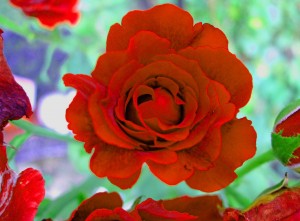ROSES
 Roses are the best know flower though out gardening and to some it is the queen of all flowers. Roses have a past and I knew that there are several breeders in England and France however in an article by Harald Enders “A New Home FOR OLD GERMAN ROSES”
Roses are the best know flower though out gardening and to some it is the queen of all flowers. Roses have a past and I knew that there are several breeders in England and France however in an article by Harald Enders “A New Home FOR OLD GERMAN ROSES”
” http://media.wix.com/ugd/e6654e_42a58c08b17d606a6c8826823a2cbe7d.pdf “I found that many roses were bred in Germany and brought into commerce before 1900. Through time and three wars many have been lost but Harald Enders is trying to find them and bring them back into production. Many of these could be the genetics of our modern rose. On further investigation, I found that there are many rose gardens in Germany the best being Sangerhausen which began in 1896 it now has about 75,000 roses.
There are those that feel roses are too tough and cantankerous to grow and they have many problems in the Midwest. Landscapers thought these Knockout Roses were indestructible and if you needed summer color just add a Knockout Rose, and everything will be fine. Now this traditional plant of landscaping is coming under attack and if you are a rose follower this is not news, it has been going on for several years. The dilemma is a virus that is passed on by an airborne mite Phyllocoptes fructiphilus. Due to its mass usage and density overload, many beds of roses have been destroyed in the past years. The hardest-hit rose is the Knockout Roses as they have been planted in mass plantings making it easy for this mite to blow from to rose. Roses are a $400.00 million industry. The U.S. Department of Agriculture’s National Institute of Food and Agriculture (NIFA) awarded $4.6 million in funding to address the garden rose pathogen. This can be followed on; “http://americanhort.theknowledgecenter.com/OnDemand/index.cfm?view=category&colid=143&cid=377 “
This will be an ongoing struggle and a solution to this problem will be a tremendous help and one that the public will get pleasure once again from roses that add great beauty to the environment. As I find new information I will post.
This entry was posted in Old and True Varieties and tagged German Roses, Harald Enders, Old German Roses, Phyllocoptes fructiphilus, Rose Rosette, Rose Rosette Disease, Roses on March 27, 2015, by Ken Wilson. Edit
